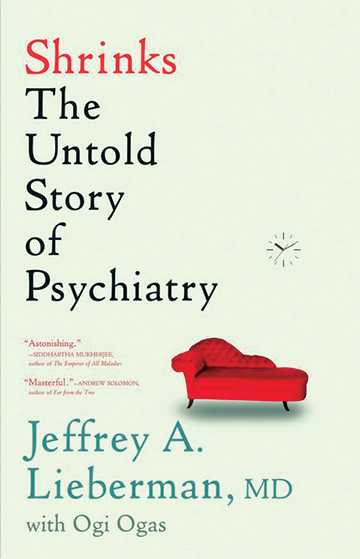Jeffrey Lieberman always has strong convictions and, fortunately, one of his convictions is Psychiatry. He is a respected researcher, with principal investigator of the National Institute of Mental Health’s Clinical Antipsychotic Trials of Intervention Effectiveness (CATIE) landmark schizophrenia study foremost among his accomplishments. He is a top academic leader as Chair of Psychiatry at the College of Physicians and Surgeons of Columbia University. Most important for this story, he was the incoming President of the American Psychiatric Association during the final days of the publication of DSM-5, when public skepticism about the integrity of Psychiatry was once again in full force. He has important “untold stories” to tell.
For those of us who know him, it is not surprising that his first untold story is the often-told story of a promising young woman who is slipping slowly into chronic schizophrenia, which her affluent, well-educated family refuses to recognize as anything other than her unwillingness to put her own life in order. His carefully considered diagnosis and successful treatment is followed by her relapse, as her family repeatedly engages expensive life coaches and holistic healers, whom he appropriately terms “rogues.” Jeff’s motivation for this book is his conviction that Psychiatry needs to speak up for itself on behalf of our patients, because its history is one of skepticism that psychiatric illnesses are real, disabling, and amenable to treatment. To accomplish this task, he first takes a readable journey through psychoanalytic and biological history into the present. Appropriately, this middle section of the book ends with another young woman slipping into what seems to be schizophrenia, whom he finds is actually suffering from marijuana abuse complicating a developmental disorder. Modern differential diagnosis saves her from what would earlier have been dismissed as chronic psychosis.
The next chapter is the most self-revealing and gives me pause even as I write about it. When he was in medical school, Jeff was assaulted in his apartment by two thugs looking to rob him. During his beating and despite threats with a gun, he did not divulge the presence of his grandfather’s Patek Phillipe watch in his dresser, his most treasured possession. The thugs eventually left with his wallet and the usual television and stereo. He describes himself as clear-headed—on “air traffic control” during the confrontation. He is left with enduring, but not pathogenic, emotional memories. He then segues to the identification of PTSD and investigations of its biology and psychology that mark the evolution of psychiatry from DSM-1 onward, as Psychiatry endeavored to explain the appearance of a new syndrome in healthy young people who served in World War II combat. Although he assures readers of his frontal cortex’s mastery at the end of the chapter, and I have no reason to doubt that, I also thought about this “untold story,” as untold stories are the routes of understanding in any autobiographic account. I decided that he was telling us that the incident showed he was ready, perhaps the experience even helped prepare him, for a professional life where he would be an unshaken combatant who would do battle whenever the cause was right. He would be unshaken by any criticism that he confronts from the same “rogues” who derailed the treatment of the psychotic woman in his first untold story.
What he would champion for Psychiatry would be DSM-5, a seeming unlikely cause to champion. Because DSM-5 serves many purposes, from guide to billing code to forensic document, it is highly complex and not necessarily tied to any one reality of biology or psychology or culture. As incoming APA President, he recognized that regardless of these underlying issues, Psychiatry’s integrity as a profession at that moment in time rested on the reception by the media and the public of DSM-5. He tells this last “untold story” in “The Triumph of Pluralism: The DSM-5.” He describes the forces against DSM-5 from former DSM editors to NIMH. As the incoming APA president, he was tireless and fearless, giving endless television and press interviews to confront its critics. In the end, the criticism became “deafening silence.” He interprets DSM-5's acceptance to the place Psychiatry has earned in society by helping patients and families, one at a time. He sees the future as bright, as people continue to step forward to make Psychiatry and the people whose illnesses we treat part of the fabric of our society. What comes clear in reading the last chapters is what he did to ensure that outcome.


